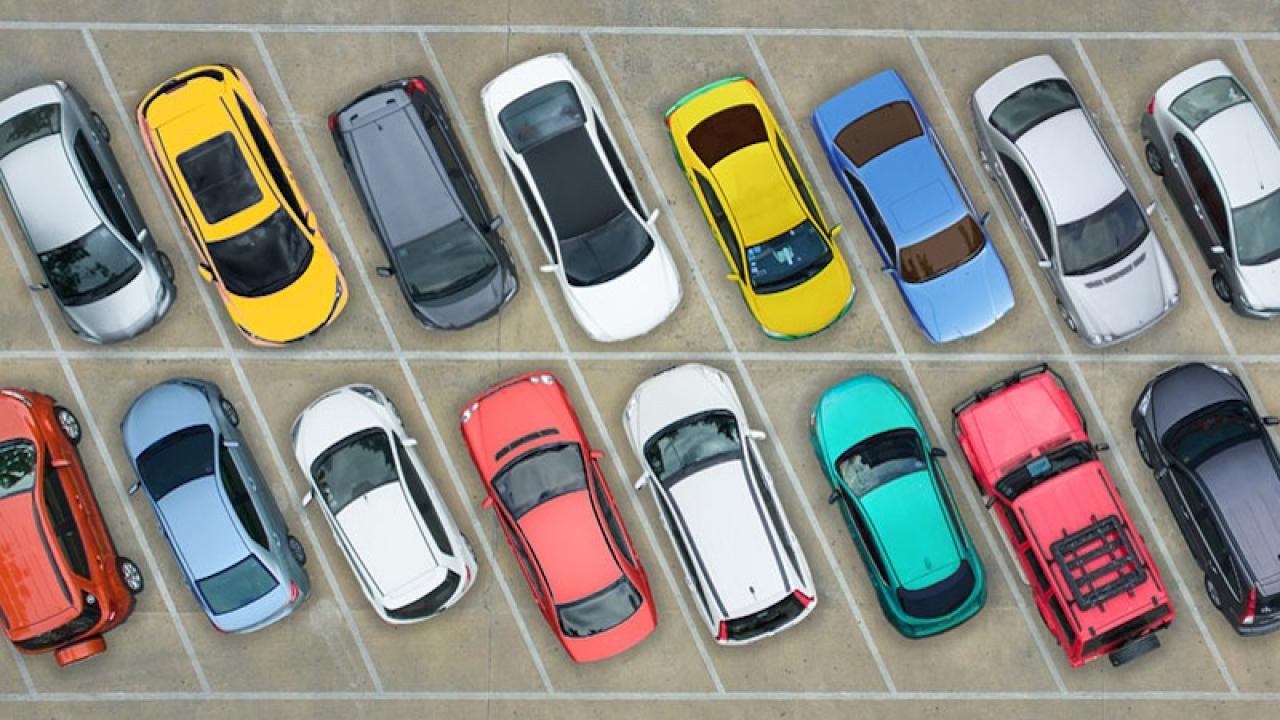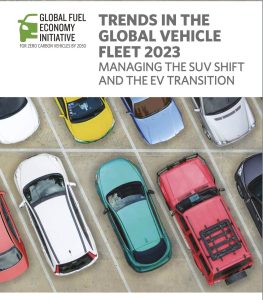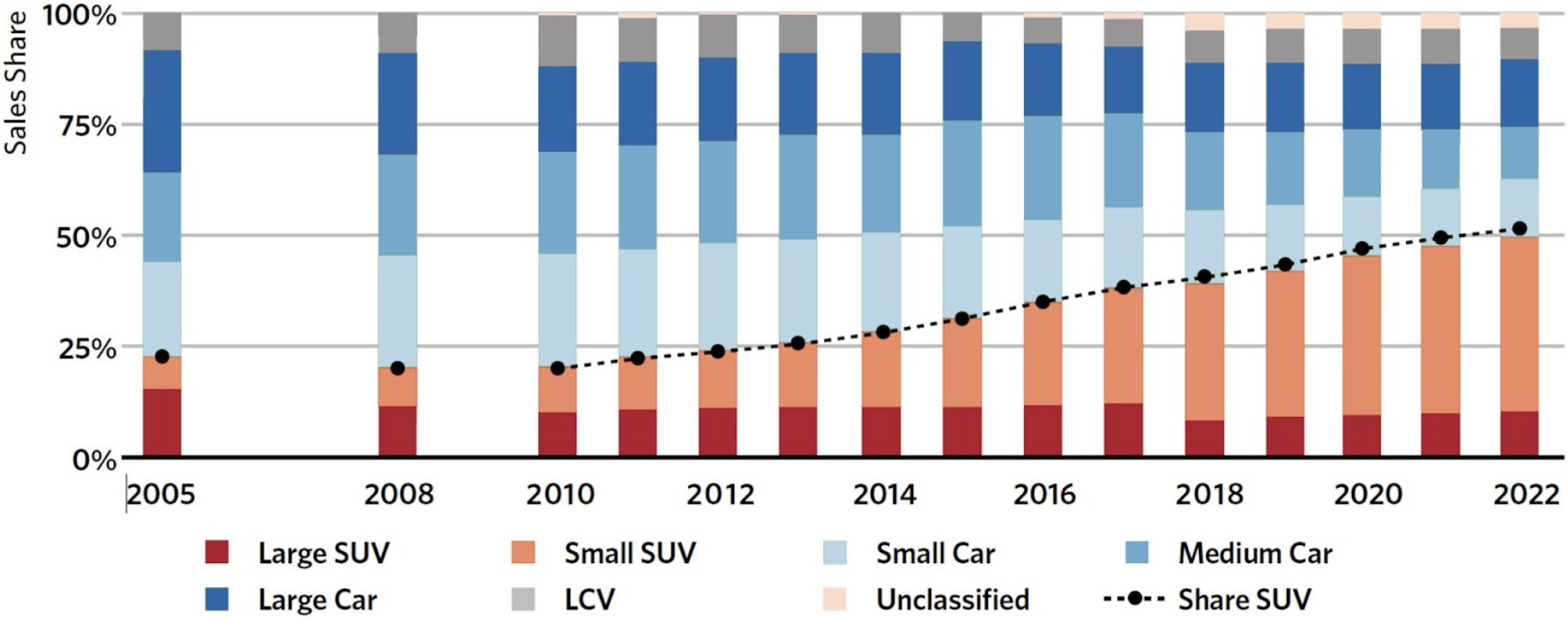
Putting the Brakes on Global Growth in SUVs Would Curb Emissions, Improve Safety, Reduce Critical Mineral Use, and Address Inequities

On the path to global transportation sustainability, electric vehicles (EVs) are making inroads, but larger cars with bigger carbon footprints are hampering climate progress. The right policies can correct our course.
A recent report by the ITS-Davis European Transport and Energy Research Centre, the FIA Foundation, and the Global Fuel Economy Initiative identifies trends in the global car market from 2010 to 2022 and their impacts on energy consumption and CO2 emissions. The report highlights increasing light-duty EV sales that have substantially reduced energy consumption and CO2 emissions alongside rising SUV sales that have counteracted these reductions.
Two Steps Forward, One Step Back
Energy and direct CO2 emissions intensities for new vehicles declined globally at a rate close to 2% per year between 2005 and 2022. From 2020 to 2022, average energy consumed per mile for new light-duty vehicles decreased faster, by 4.2% annually, on average. CO2 emissions per mile declined almost 6% annually in the same period. These accelerations are mainly due to an increase in EV sales.
Emissions could have fallen farther, however.
A persistent shift to larger and heavier SUVs is offsetting benefits from EVs. Global sales of SUVs increased from 22% of all light-duty vehicles in 2005 to 51% in 2022. The case of the US is extreme, by global standards, with SUVs and pick-up trucks now accounting for 75% of all vehicles sold.

If the global average weight of vehicles had stayed constant since 2010, energy and CO2 emission intensities of combustion engine vehicles would have declined about 30% faster. The shift to SUVs also exacerbated equity and road safety challenges, due to their higher prices and danger to other road users.
This trend toward bigger and heavier vehicles is not limited to combustion engine vehicles. EVs are also getting larger, creating more demand for critical materials, such as lithium and cobalt, that are subject to supply risk—adding to possible bottlenecks for EV production in the absence of policy action. The report on vehicle trends offers policy suggestions to steer markets toward cleaner vehicles and away from large and heavy vehicles.
Quick Stats
- The global average weight of a “light-duty vehicle” reached an all-time maximum of 3,370 lbs (1,530 kg) in 2022
- Batteries increased globally from 40 kWh/vehicle in 2017 to 60 kWh/vehicle in 2022 on average, resulting in heavier vehicles and greater demand for critical materials
- In the US, SUVs and pickup trucks increased from 43% of sales in 2010 to 75% in 2022, of which 38% were large SUVs
Better policy needed to meet emissions goals
Policies encouraging the downsizing of vehicles and boosting of the EV market are needed to reduce climate change and meet net-zero greenhouse gas emissions goals.
Downsizing (and down-weighting) vehicles would also increase road safety and reduce inequities, especially in countries that have limited alternatives to car travel. Downsizing would make EVs more affordable and reduce the amount of critical minerals needed for batteries, thereby reducing the social, environmental, and geopolitical security risks from mining and mineral processing.
Policy recommendations
- Reduce the sales-weighted average footprint and weight of vehicles over time.
- Reduce battery weight and capacity (kilowatt-hours per vehicle) using a corporate average approach, as is done with fuel economy standards. These limits would restrict the growing demand for critical materials and the negative human and environmental impacts from mining, including in low-income and underserved communities.
- Regulations on the size and weight of vehicles (including EVs) should reward innovation (and reduce costs) by allowing the trading of credits across vehicle categories and companies, as is now done in Europe and the US with emissions and fuel economy standards.
- Eliminate regulatory carve-outs for SUVs and pickup trucks—which have been used in the US and are a primary factor in the rapid transition from cars to SUVs.
- Introduce more stringent environmental regulatory requirements and require more stringent safety standards for heavily-used vehicles, such as those used by ride-hailing and taxi drivers since the EV transition is more cost-effective in these cases, and road safety benefits are higher for vehicles that travel more.
- Regulations and incentives should be expanded to allow universal and equitable access to EV charging infrastructure—including requiring or funding charger installations in or near multi-unit dwellings.
- Vehicle taxes should be differentiated on the basis of energy efficiency and environmental impacts. They should also be modulated based on size, weight, and price to respond to challenges for equity, road safety, and material demand. Taxes and charges adopted at the local level can also be tailored to respond to these effects. Key examples already exist in Paris and other French cities, which will start applying in 2024 parking fees differentiated based on size and weight and engine type.
A shift away from SUVs, paired with tailored and continuous support for EVs, will be crucial to reducing CO2 emissions, enhancing energy savings, improving road safety, and addressing social inequities within and across countries. The task is complex, but we know what can be done, and we can build on and learn from policy and technological innovations from around the world.
—
Pierpaolo Cazzola is Director of the European Transport and Energy Research Centre at ITS-Davis.
